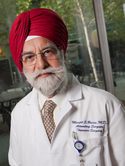| Abstract: |
Purpose: The management of superficial primary and recurrent esophageal cancer (EC) in medically inoperable patients is complex. Endoluminal high-dose-rate (HDR) brachytherapy has shown mixed results in terms of toxicity and local control. In this study, we examined the outcomes and toxicities in a set of patients with superficial primary and recurrent EC treated with a consistent HDR technique. Methods and Materials: Between 8/2008 and 7/2011, 14 patients were treated with HDR intraluminal brachytherapy, 10 (71.4%) with recurrent disease, and 4 (28.6%) with previously unirradiated lesions. Patients received three weekly fractions to a median dose of 12 Gy (range, 10-15 Gy); dose was prescribed to 7-mm median depth with mucosal dose limited to 8-10 Gy using a 12-14-mm applicator. Results: Median followup was 15.4 months. Overall freedom from failure (OFFF) and overall survival (OS) at 18 months were 30.8% (95% confidence interval [CI]: 5.2, 56.4) and 72.7% (95% CI: 45.3, 100), respectively. For patients with recurrent disease, OFFF and OS at 18 months were 11.1% (95% CI: 0, 32.1) and 55.6% (95% CI: 15.4, 95.8), respectively. For patients with previously unirradiated disease, OFFF and OS at 18 months were 75.0% (95% CI: 31.6, 100) and 100.0%, respectively. Eight (57.1%) patients had Grade 1 acute adverse effects; 6 (42.9%) patients had chronic Grade 1 adverse effects; 1 (7.1%) patient developed Grade 2 stricture. Grade 3 tracheoesophageal fistula occurred in 1 (7.1%) patient. One patient died before completion of treatment of unrelated causes. Conclusions: HDR endoluminal brachytherapy is a well-tolerated treatment for superficial primary and recurrent EC in medically inoperable patients. © 2013 American Brachytherapy Society. |












